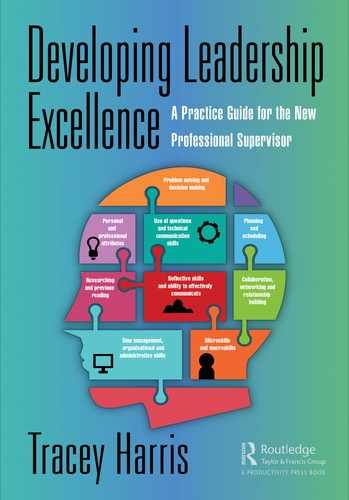3Quality Supervision Training
Optimal performance comes through great leadership. Great leadership is about developing others through effective conversations and being the right coach.
Becoming an experienced supervisor is a developmental journey. It takes time, ongoing development and an understanding of what existing skills and knowledge you already have as a professional. There are various things that contribute to the development of supervisors, and training is one of them. Many supervisors have never attended training and often do not engage in ongoing professional development to support their supervisory practice. Prior to becoming a professional supervisor, try to attend quality training. Engaging in training provides you with a range of resources and tools that will assist you to understand the skills necessary to provide supervision, how to establish the supervision process and to explore relevant supervision models to use in discussions (Blair & Peake, 1995; Kadushin & Harkness, 2014; Watkins & Milne, 2014).
Before we explore training, let’s consider what other things are important for your ongoing development in between attending training and then beyond training. Even though you may be a new supervisor, you already have a broad range of emerging skills and abilities that you bring to the role. For example, you will have many transferable or portable skills and knowledge that you have gained from other roles and life experiences that will come with you into the supervisory role. You will have a range of abilities and skills that you gained at different ages and stages of your life, from your family upbringing and other environments, that all play an important part in where you are now.
What transferable skills do you think you will bring with you from your experiences into your supervisory role?
Other transferable skills may include how you like to communicate; the things that motivate you; what your key values and beliefs are; how organised you like to be; how you develop professional relationships; and how you like to learn, set goals and relate to others. Transferable skills (see Figure 3.1) are drawn from many aspects of your personality, attributes and thinking preferences and are used as you move from one role to another, through the different stages of your career and from organisation to organisation.

Figure 3.1Transferable skills.
Training
Now that we have considered what transferable skills you will have to take into the supervisory role, let’s think about what training may be useful to enhance your existing skills and knowledge. There are some great training programs available in professional supervision. Different professional associations advertise supervision training through their annual training calendars, so if you have membership in an association, check if they have an annual training calendar. It can also be useful to ask some of your colleagues to recommend training that they may know of or have attended. Your own supervisor or your organisation may also know of great supervision training.
When you have identified training that is of interest to you, it is worth calling the training organisation to speak with the facilitator or organiser to discuss what is included in the program or workshop, what level the training is pitched at and if it is the right one for you. It is not great when you attend training only to find that the material is not at the level of what you need or where you have taken valuable time out of your work schedule to attend training that is not interesting or informative. It is great to attend training that validates your skills and knowledge; however, for you to use what is presented in training, it needs to have an element of new information contained in the program.
Quality training may cost a little more per day, but it is a worthwhile investment in the long term. It is also important to review the training flyer to ensure the topic areas listed can assist you to develop relevant supervisory skills you need in your new role. Remember, good training builds confidence, validates what you may already know and provides you with new information and skills (Bernard & Goodyear, 1992; Egan, 2012; Gonsalvez & Milne, 2010).
Also consider the duration of the training you are attending. Introductory or foundational training is often one day, and intermediate and advanced training can be two, three or five days. The training may be offered in shorter periods over a longer time period, that is, six to twelve months on a monthly basis, or can be delivered in two to three hour blocks of time each week or month for a period of time. This type of training is more conducive to effective learning, is far more brain friendly and allows you to learn and then embed new skills into your supervisory role. It also enhances existing skills and allows you time to test out in supervision what you have learned and then take these learnings back into the next training session.
Other training providers will offer a mixed mode of training that includes online, face-to-face and offline reading and activities. Whatever you decide is right for you, it is useful to know who the facilitators are and if they just provide training in supervision or are in another role and provide training in addition to their role. It is also important to understand if they receive professional supervision themselves. Having experienced and skilled facilitators makes the difference between good and excellent training (Proctor, 2000).
What to Look for in Quality Training
When considering attending supervision training, think about some of the following questions to ensure you choose training that is right for you.
What topics do you think are useful for you as a new supervisor?
What information are you looking for?
What skills do you need to practice effective supervision?
Do you want to go to training that focuses on only a couple of topics or is broader in its coverage of topic areas?
What can the training offer you?
How long do you want to attend training for, and what duration would you like the training to be?
What do you know about the training provider/facilitator?
What will you get for the investment?
Would you like to join a smaller or larger training group?
What experience does the facilitator/trainer have?
Can you transfer the information from the training directly back into your new role immediately and then in the medium term?
Can you practice elements of the training straight away so that you don’t lose the information too quickly after you have attended the training?
Is the training primarily theoretical in its content and outcome?
Does the training provide you with a systematic system and framework about supervision, or does it provide you with just one or two aspects of supervision?
As a guide, a one-day training can cost anywhere between $220 AUD and $550 AUD, up to a three-day training at $1,800 AUD. This gives you a guide of what type of investment may be involved and how you can use the investment wisely. There will also be times when you won’t know if the investment was worthwhile until you finish the training, but for the most part, reviewing the training flyer is a great way to get a feel for the quality of the training program.
When you are looking for reputable and quality training, as a guide, Table 3.1 provides some topic areas that are important to cover in a supervision training program.
√ |
How to Support and Guide Supervisees to Get the Most from Their Supervision |
|---|---|
Understand the process in which professional supervision takes place, that is, what is supervision and why it is important, burnout and self-care in supervision, the process of supervision, benefits and purpose of supervision, roles and responsibilities of both parties, setting the supervision agenda, developing the supervision agreement, understanding supervision policy, confidentiality and privacy, purpose of supervision and the tasks that are required in supervision, documents, storage, etc. | |
Understand the important elements of being an effective supervisor | |
Explore the ethical and industrial contexts in which supervision takes place | |
Explore what documents are required in supervision | |
The process of reflection in supervision | |
How to provide useful feedback in supervision, technical communication skills, developing a feedback framework | |
Understand the different types of supervision, that is, clinical, administrative, professional, non-clinical, non-professional, formal, etc. | |
Setting up a framework for culturally appropriate supervision | |
Dealing with and responding to challenges in supervision | |
How to reinvigorate supervision when it becomes stale or ineffective | |
How to evaluate supervision for it to remain effective | |
Understand the skills and competencies supervisors require to effectively undertake their role | |
Supervisor communication styles | |
Understand different supervisor styles and approaches | |
Communication techniques and skills | |
Develop a positive supervisory relationship | |
How the annual review process links to supervision discussions |
Many of these topics may also be included in intermediate and advanced training, but at a deeper and more complex level. It is also useful to have a practice component in training so that it is not just all about the theoretical perspectives of supervision.
Now that we have explored what is useful to look for in training courses on professional supervision, what do you think you might need from training to support you in your new role?
I need training to focus on the following skills for me to be a competent and skilled supervisor:
__________________________________________________________
__________________________________________________________
__________________________________________________________
I would like to increase my knowledge about:
__________________________________________________________
__________________________________________________________
__________________________________________________________
I need to increase my competencies/skills in the following areas:
__________________________________________________________
__________________________________________________________
__________________________________________________________
I already have the following qualities and attributes as a supervisor:
__________________________________________________________
__________________________________________________________
__________________________________________________________
Things I need from training are:
__________________________________________________________
__________________________________________________________
__________________________________________________________
The topic areas I would like to see in training are:
__________________________________________________________
__________________________________________________________
__________________________________________________________
The type of training that works best for my learning style is:
__________________________________________________________
__________________________________________________________
__________________________________________________________
The ideal duration of training for me at this time is:
__________________________________________________________
__________________________________________________________
__________________________________________________________
I need to consider the following from what others have advised about supervision training:
__________________________________________________________
__________________________________________________________
__________________________________________________________
I am not that interested in the following training:
__________________________________________________________
__________________________________________________________
__________________________________________________________
These are the other things I need to consider to continue my professional development:
__________________________________________________________
__________________________________________________________
__________________________________________________________
Now that we have explored how important training is and focused on what you might look for in a training workshop or program, there are other things such as having supervision yourself, reading and researching supervision that are just as important if you find it difficult to get to training prior to commencing in your role.
Chapter 3 Summary
In this chapter, we have explored the importance of attending training prior to becoming a professional supervisor. Consider doing some research about potential training, and talk to other supervisors or colleagues. Contact or email your professional association if you are a member to talk to them about what training they can offer. Training will enhance your existing skills and knowledge, provide you with new information and give you increased confidence to go into the role.
Key points to consider regarding quality supervision training.
